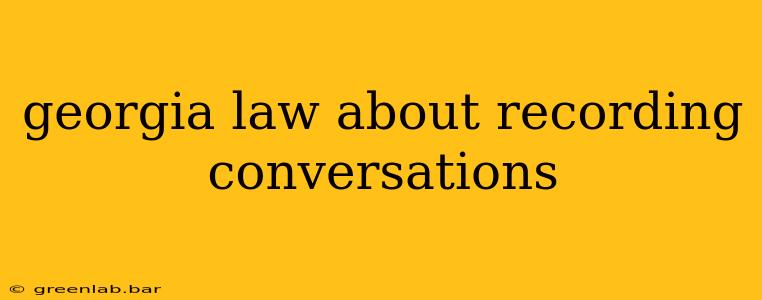Georgia's laws regarding the recording of conversations are complex and often misunderstood. This guide provides a clear and comprehensive overview of Georgia's one-party consent law, outlining what is legal, what is not, and the potential consequences of violating these laws. Understanding these laws is crucial for anyone living in, working in, or visiting Georgia, to avoid legal repercussions.
Georgia's One-Party Consent Law Explained
Georgia is a one-party consent state. This means that only one participant in a conversation needs to be aware of and consent to the recording. This contrasts with two-party consent states, where all parties must agree to the recording. Therefore, you can legally record a conversation in Georgia as long as you are a party to the conversation. This includes recording phone calls, in-person conversations, and other forms of audio or video recording.
What This Means in Practice:
- You can record conversations you are a part of: This applies to personal conversations, business meetings, interviews, and more. You do not need to inform the other party that you are recording.
- You cannot record conversations you are not a part of: Secretly recording a conversation between two other people without their knowledge or consent is illegal. This is considered wiretapping, and it carries significant legal penalties.
- Consent is not required from the other party: While it is ethically sound to inform the other party you are recording, Georgia law does not require you to do so. However, failure to disclose might affect the admissibility of the recording in court, depending on the circumstances.
Exceptions and Considerations
While Georgia's one-party consent law grants considerable leeway, there are some exceptions and important considerations to keep in mind:
Expectation of Privacy:
Even with one-party consent, recording conversations in locations where there is a reasonable expectation of privacy (such as a bathroom or changing room) might still lead to legal trouble, regardless of your participation. The key is whether a person would reasonably expect their conversation to remain private in that location.
Dissemination of Recordings:
While recording a conversation is legal under one-party consent, how you use that recording has legal implications. Distributing or sharing a recording without the consent of all parties involved could lead to civil lawsuits for invasion of privacy or other legal claims, especially if the recording contains sensitive information.
Federal Laws:
It's important to note that federal laws may also apply, particularly regarding interstate communications. Certain federal statutes might prohibit the interception of wire, oral, or electronic communications, even in one-party consent states. These statutes are generally more restrictive and carry stricter penalties.
Penalties for Illegal Recording
Violating Georgia's wiretapping laws can result in serious consequences, including:
- Criminal charges: This includes felonies and misdemeanors, depending on the circumstances and the nature of the violation.
- Civil lawsuits: Individuals whose privacy has been violated may file civil lawsuits seeking monetary damages.
- Incriminating evidence excluded from court: Illegally obtained recordings are typically inadmissible as evidence in court.
When to Seek Legal Advice
The complexities of Georgia's recording laws mean that navigating them without legal expertise can be tricky. If you have any questions or concerns about recording conversations in Georgia, it is strongly recommended to seek advice from a qualified legal professional. They can provide tailored guidance based on your specific circumstances.
This information is for educational purposes only and should not be considered legal advice. Always consult with an attorney for advice on specific legal matters.

